The Fryderyk Chopin University of Music in Warsaw is among the oldest and largest schools of music in Poland, as well as one of the oldest in Europe. It inherited a nearly two-hundred-year-old tradition of public music teaching in Warsaw. Historically, the University’s most memorable date is the year 1810. Two important events took place that year: the birth of Fryderyk Chopin, patron of the school, and the permit for the founding of the School of Drama, attached to the National Theatre by Wojciech Bogusławski. The school, meant for actors and singers of the theatre, was transformed into a college of music under Józef Elsner — a well-known composer, conductor and teacher. In 1821 the school took the name of “The Institute of Music and Recitation” or “The Conservatory” and became a division of the Warsaw University Department of Fine Arts. It provided full musical education. In 1826 the institute was divided into two units: The Main School of Music, functioning within the university framework, and The Dramatic and Vocal School, comprising primary and secondary education. Between the years 1826 and 1829, Fryderyk Chopin studied at the Main School of Music. Towards the end of the second year of Chopin’s studies his teacher, Józef Elsner, declared his memorable opinion of him as an “extraordinary gift, a musical genius”.
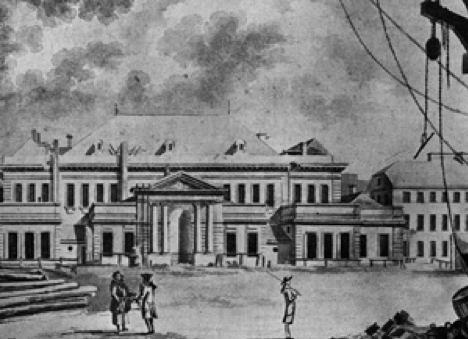
National Theatre in Warsaw, address: Pl. Krasińskich
The school underwent numerous changes inevitably connected to the history of the country and city. All of the national uprisings aimed at the occupying rulers consequently restricted or eliminated cultural institutions. Thus, when the University of Warsaw was dissolved in 1831, Elsner’s Main School of Music also ceased to exist. This was one of the repressive measures which followed the November Uprising. Thirty years later, in 1861, the heritage of the Main School of Music was taken over by the Apolinary Kątski Institute of Music, which existed until 1918. When Poland regained independence, the school was nationalised and given the name “Conservatory”. It existed and functioned uninterrupted until the outbreak of World War II. During the Nazi occupation, under the name of Staatliche Musikschule in Warschau, the school followed the curriculum of the pre-war conservatory. The 1944 Warsaw Uprising resulted in the destruction of the school’s building in Okólnik Street. In 1946, after the Second World War, the school was granted the name of “The Higher State School of Music” and was housed in the mansions of Ujazdowskie Avenue. The present edifice of the school in Okólnik Street was erected between 1960 and 1966. In 1962, the school was granted full academic status and the right to confer MA diplomas in all disciplines of music. A branch of the school was created in Białystok in 1974, which was transformed into the FCAM Out-Of-Town Department in 2007. In 1979, the school took on the name of its patron becoming The Fryderyk Chopin Academy of Music. At present the name has been changed into The Fryderyk Chopin University of Music.
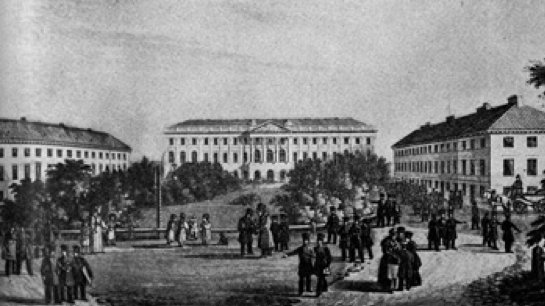
Kazimierzowski Palace, ul. Krakowskie Przedmieście 26/28
The Warsaw school is proud of its outstanding alumni (many of them have been involved in educational activity). Though the figure of Fryderyk Chopin predominates, there are numerous other musicians of international renown. Among them are: Ignacy Jan Paderewski, Zygmunt Noskowski, Mieczysław Karłowicz, Grzegorz Fitelberg, Ludomir Różycki, Mikalojus Konstantinas Čiurlionis, Grażyna Bacewicz, Witold Lutosławski, Stefan Kisielewski, Michał Kondracki, Jan Maklakiewicz, Artur Malawski, Andrzej Panufnik, Piotr Perkowski, Bronisław Szabelski, Antoni Szałowski, Zbigniew Turski, Paweł Klecki, Stefan Śledziński, Bohdan Wodiczko, Antoni Szaliński, Wanda Landowska, Jerzy Lefeld, Stanisław Szpinalski, Józef Chwedczuk, Feliks Rączkowski, Bronisław Rutkowski, Józef Jarzębski, Eugenia Umińska, Tadeusz Wroński, Kazimierz Czekotowski, Benedykt Górecki, Ludwik Kurkiewicz, Janusz Urbański…
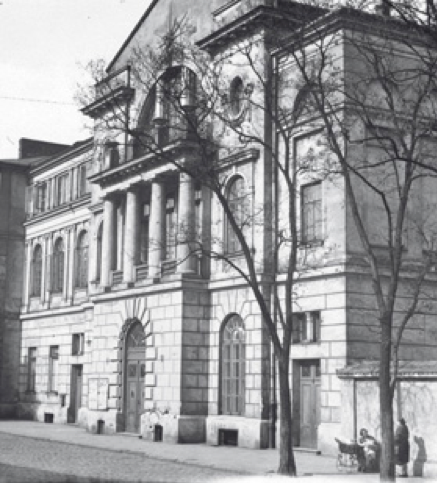
The edifice known as the Conservatory, ul. Okólnik 1
The identity of the school has been carved in constant dialogue with the achievements of other cultural circles. The school’s graduates have been aided by the teachers who came to Warsaw from other regions. The traditions of the Warsaw school have been developed by Stanisław Moniuszko, Władysław Żeleński, Aleksander Michałowski, Józef Turczyński, Zbigniew Drzewiecki, Irena Dubiska, Walerian Bierdiajew, Wincenty Laski, Józef Karol Lasocki, Henryk Czyż, Stanisław Wisłocki, Tadeusz Szeligowski, Witold Rudziński, Tadeusz Baird, Hieronim Feicht, Antoni Karużas, Margerita Trombini-Kazuro, Maria Wiłkomirska and Tadeusz Wiłkomirski, Arnold Rezler, Mieczysław Szaleski, Ada Sari, Wiktor Brégy. Part of the university’s heritage is the strong current of Chopinistics and Chopinology. Its graduates are the editors of Chopin’s works: Jan Kleczyński, Ignacy J. Paderewski, Józef Turczyński, Jan Ekier. In piano classes of Józef Turczyński, Zbigniew Drzewiecki, Stanisław Szpinalski, Henryk Sztompka, Margeriay Trombini-Kazurowa, Jan Ekier, Piotr Paleczny the prize-winners of Chopin Competitions were educated. Honorary degrees were conferred upon the following for their special contribution to musical pedagogy: at the Warsaw National Conservatory — Józef Hofman (1934), at the Fryderyk Chopin Academy of Music — Regina Smendzianka, Stanisław Wisłocki (1997) and Bogusław Madey (2004).
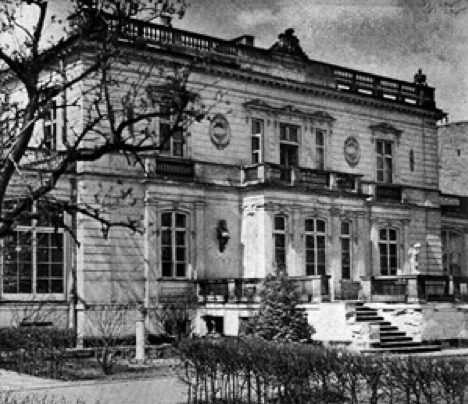
Sobański Palace, Al. Ujazdowskie 13
One of the specific features of the University of Music is its openness. Perhaps the geographical location and metropolitan functions of Warsaw, the capital of Poland, are one of the reasons why it has attracted musicians representing such a variety of artistic formations. It was here that Jerzy Żurawlew, Professor at the Warsaw school, established the International Chopin Competition in 1927 and several graduates of the pre-war conservatory were among the winners: Jan Ekier, Bolesław Kon, Witold Małcużyński, Stanisław Szpinalski and Henryk Sztompka. In the interwar period they were joined by the Higher State School of Music and FCAM graduates: Barbara Hesse-Bukowska, Fou Ts’Ong, Andrzej Czajkowski, Piotr Paleczny, Janusz Olejniczak, Takashi Yamamoto. Other international competitions have also been organized at the University, i.e., the International Tadeusz Wroński Competition for Solo Violin, the International Organ Competition, the International Wanda Landowska Harpsichord Competition, the International Witold Lutosławski Cello Competition.
The Warsaw University of Music continues to maintain very intensive contacts with other music communities, as attested to e.g. by the school’s permanent co-operation with many European music academies within the Socrates/Erasmus Program and also with several non-European schools. The University has particularly close relations with Soai University (Osaka) and Keimyung University (Daegu). It is also a member of several international music school federations: Association Européenne des Conservatoires, Académies de Musique et Musikhochschulen (AEC) and the Association of the Baltic Academies of Music (ABAM).
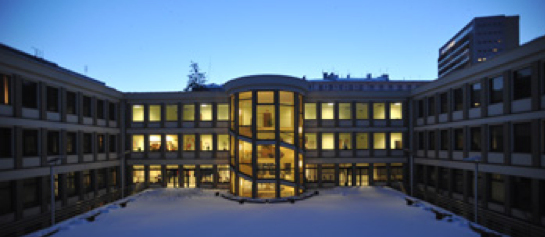
Current photo of the University
The Fryderyk Chopin University of Music has distinguished people of particular merit in the art of music with honoris causa doctorate degrees. Among them we can find: Nadia Boulanger, Kazimierz Sikorski, Stefan Śledziński, Artur Rubinstein, Igor Bełza, Witold Lutosławski, Andrzej Panufnik, Tadeusz Wroński, Jean-Pierre Rampal, Krzysztof Penderecki, Jan Ekier, Witold Rudziński, Mścisław Rostropowicz, Regina Smendzianka, Stefan Sutkowski, Placido Domingo, Jerzy Semkow, Joachim Grubich, Andrzej Jasiński, Synn Ilhi, Christa Ludwig, Bernard Ładysz, Guy Bovet, José Antonio Abreu, Krystian Zimerman, Roderyk Lange and Szabolcs Esztényi.
Professor Mieczysława Demska-Trębacz, Ph.D.








